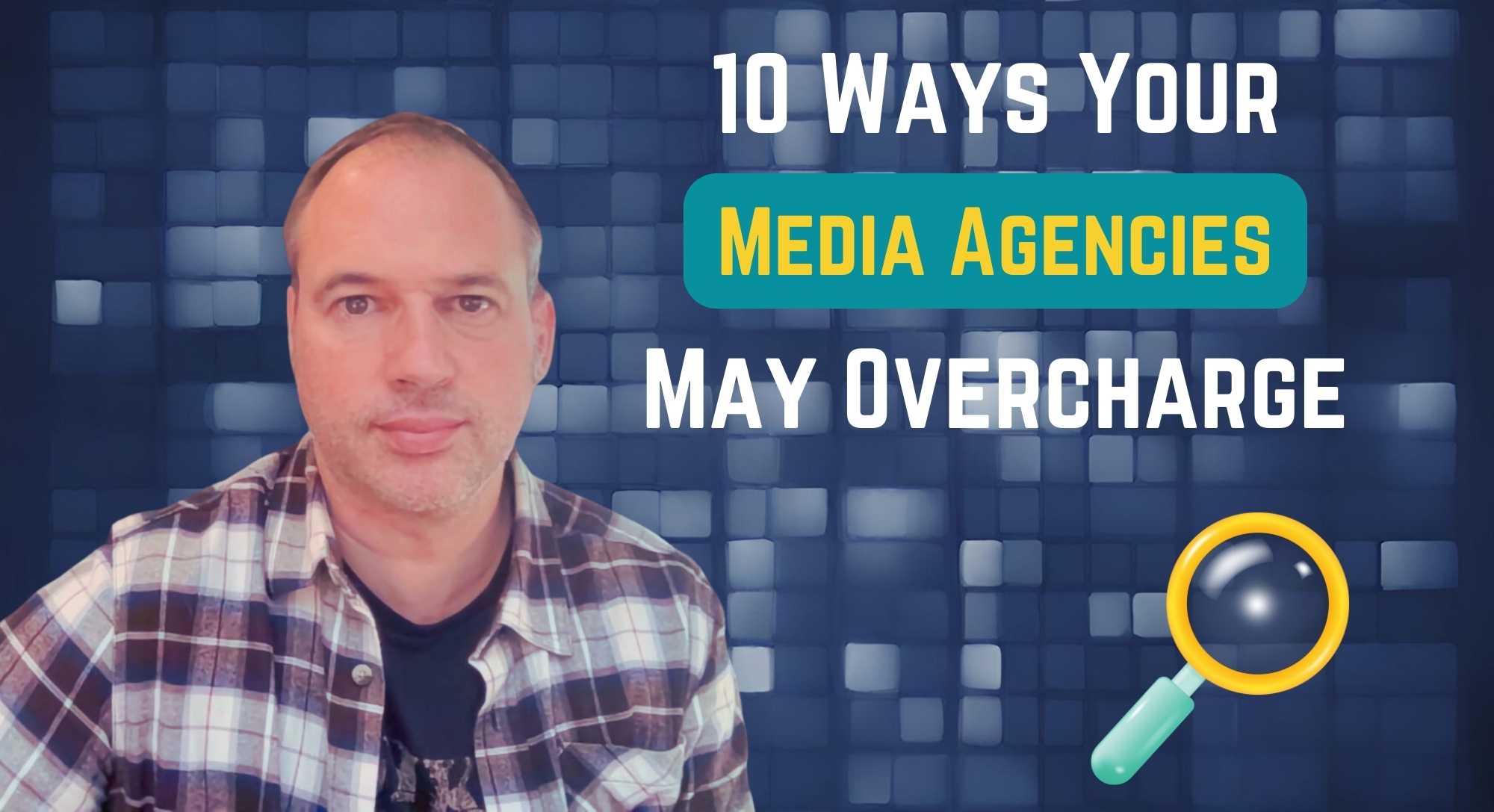At Abintus, our extensive experience as international media consultants has given us a unique vantage point. Every day, we meticulously review media agency documents from all major markets worldwide as an integral part of our holistic media audit services. This in-depth analysis allows us to delve deep into the operations of numerous media agencies, ensuring they adhere to the stipulations set out in our client's media agency contracts.
Our position allows us to "look under the hood", examining the intricate workings of these agencies. Through our rigorous evaluations, we've discerned patterns and practices that, unfortunately, lead to advertisers being overcharged. These discrepancies are not isolated incidents; they are consistent across agencies and markets.
With this article, our intention is clear: to shed light on the 10 predominant ways advertisers find themselves paying more than they should. By sharing our findings, we aim to equip advertisers with the knowledge they need to navigate the complex world of media agency billing with caution and confidence.
1. Agency Miscalculation of Media Agency Remuneration
One of the most prevalent discrepancies we've identified at Abintus pertains to the miscalculation of media agency remuneration, especially in commission-based models.
Let's break this down. Typically, a contract might stipulate that the agency's remuneration should be calculated as a percentage of the Net media cost. Simple enough, right? However, the waters get muddied when we delve into the definitions of "Net" and "Gross" costs.
In some instances, what is termed as the Gross Negotiated cost is also referred to as the Net cost. Conversely, what should be the true Net cost is sometimes labelled as Net Net. This ambiguity, or at times the complete absence of clear definitions, can lead to significant financial discrepancies.
To illustrate this with numbers:
Suppose the Gross Negotiated (or Net) cost stands at 1,000,000, while the Net cost (or Net Net) is 850,000. If the agency's remuneration is set at a commission of 5% based on the Net Cost, the calculation should ideally be 850,000 multiplied by 0.05, equating to 42,500.
However, due to the aforementioned ambiguity, we've observed instances where the commission is erroneously calculated based on the Gross Negotiated cost. This means the calculation becomes 1,000,000 multiplied by 0.05, resulting in 50,000. This seemingly minor oversight leads to the agency's remuneration being inflated by a staggering 18% more than what it should have been.
Such discrepancies highlight the importance of clarity and vigilance in media contracts. It's not just about understanding the terms but ensuring they are applied correctly. An 18% overcharge might seem trivial on paper, but when dealing with large sums, as is often the case in media advertising, it translates to a significant financial impact.
2. Agency Mark-ups on Digital Media Technical Costs
Digital media technical costs encompass a range of expenses, including Ad Server costs, DSP costs, Viewability tracking costs, Brand Safety costs, Ad Fraud detection costs, and more. These are the behind-the-scenes charges that ensure the smooth and efficient delivery of digital ads to the target audience.
The calculation of these costs is typically based on tangible metrics such as the actual number of impressions, clicks, or even as a percentage of net spend. On the surface, this might seem straightforward. However, the waters become murky when it comes to how these costs are reported by media agencies.
A common challenge advertisers face is the lack of transparency in these reports. More often than not, agencies present a singular figure without shedding light on its derivation. This opacity makes it nearly impossible for advertisers to verify if the agreed or committed rates have been duly applied.
At Abintus, our approach is methodical. When reviewing this data for our clients, we meticulously reconstruct the technical costs. Using the actual delivery metrics (be it impressions, clicks, or net spend) and juxtaposing them with the agreed/committed rates, we aim to ascertain the accuracy of the reported and invoiced technical costs.
Our findings, unfortunately, have often revealed discrepancies. Media agencies, in some instances, apply undisclosed mark-ups to the final technical costs. These mark-ups, hidden in plain sight, constitute a clear overcharge. For advertisers who don't delve into the nitty-gritty, these overcharges go unnoticed, leading to unwarranted financial drains.
3. Misapplication of Commission Rates on Adjacent Costs
Under a commission-based remuneration model, the agency's fee is calculated by applying an agreed or contractual rate to the actual media spend. This should straightforwardly exclude any ancillary costs, such as the technical costs associated with digital media or the production costs tied to Out-of-Home (OOH) advertising.
However, the reality isn't always as clear-cut. Our comprehensive audits have unveiled instances where media agencies have not adhered strictly to this model. Instead, they've applied the agreed commission rates not just to the primary media spend, but also to the adjacent technical and production costs. This seemingly minor deviation can significantly inflate the agency's remuneration.
Such practices, unless explicitly stipulated in the media agency contract, are clear overcharges. And in our extensive experience, having such stipulations in contracts is virtually unheard of.
4. Agency Invoicing Based on Plans, Not Actual Results
For many of our clients, particularly challenger brands, the norm is to receive invoices from media agencies upfront, based on the anticipated or planned delivery of a campaign. This might seem like a practical approach, but it's where many discrepancies arise.
The ideal procedure post-campaign is for media agencies to compare the planned delivery against the actual results. Given the unpredictable nature of media campaigns, it's a rarity for these two figures to align perfectly. Once this comparison is made, the next logical step is for agencies to issue true-up invoices or credit notes to reconcile any differences.
However, our audits at Abintus have unveiled a concerning trend. In numerous cases, media agencies have bypassed this reconciliation process entirely. More alarmingly, we've identified instances where the actual campaign delivery was notably lower than what was initially planned. Despite this shortfall, advertisers were left in the dark, with no true-up credit notes issued to account for the discrepancy.
Such practices are unequivocal overcharges. Advertisers should be billed based on tangible results, not mere projections. It's imperative for advertisers to be vigilant, ensuring that they're charged for what was delivered, not just what was promised.
5. Agency Double Charging for Tools and Technology
Media agencies are equipped with a plethora of tools and platforms, each designed to optimise and enhance the advertising process. Depending on the specific needs of a campaign and the stipulations of their contract with advertisers, agencies might deploy a full suite or just a select few of these tools.
However, a recurring discrepancy we've identified at Abintus pertains to the billing of these technological assets. On numerous occasions, we've observed media agencies issuing separate invoices for the use of planning tools, research platforms, or other technological resources. This might seem standard, but the catch lies in the contract. Many of these tools and platforms are explicitly mentioned in the media agency contracts as being encompassed within the agency's base remuneration. In essence, this means advertisers are being billed twice for the same service: once within the base fee and then again as a separate charge.
Such practices are clear overcharges. It's akin to paying for a service package and then being billed again for one of the included features. Advertisers must exercise caution, especially when faced with invoices that don't directly pertain to media or agency remuneration. It's crucial to cross-reference these charges with the contract and ensure that any additional technology costs are both excluded from the base remuneration and have received prior approval.
6. Agency Not Delivering on their Contractual Obligations
Media agencies often make a series of pledges to advertisers during media agency pitches, encompassing aspects like media pricing, quality, cash AVBs/Rebates, Digital Media Technical Costs, and more. These commitments, on paper, promise competitive advantages and significant savings. However, the mere existence of these commitments doesn't guarantee their fulfilment.
A pitfall many advertisers stumble into is the lack of rigorous tracking of these agency commitments. It's akin to setting goals but never reviewing progress. Some advertisers, in a more concerning trend, even allow their media agencies to self-assess their performance. This is tantamount to letting students grade their own exams. The media agency, in such cases, calculates and self-validates that they've met their commitments in full. This approach is fraught with bias and potential oversight.
Our audits at Abintus have consistently shown that advertisers who don't actively monitor these commitments often find them unfulfilled. The anticipated savings, instead of materialising, vanish into thin air, leading to disillusionment and frustration. In our perspective, if a media agency fails to deliver on the pricing commitments outlined in their contract with advertisers, it's not just a breach of trust; it's an overcharge.
For advertisers, the lesson is clear: Trust, but verify. Relying solely on the agency's word is a gamble. It's imperative to employ independent third-party verification to ensure that every commitment is met, every promise is kept, and every penny is accounted for.
7. Agency Retaining AVBs for Itself (or Part of It)
AVBs, or Agency Volume Bonuses, are a familiar and longstanding concept. At their core, AVBs represent rebates or discounts that media owners extend to agencies as a reward for bulk purchases. Think of them as a nod to the age-old principle of volume discounts, but with a twist that's unique to the advertising industry.
Historically, the dynamics of AVBs were simple. As agencies ramped up their spending with media owners, they'd be rewarded with incentives, be it in the form of cash or complimentary advertising slots. But as the media landscape evolved, sprouting a myriad of channels and witnessing agencies' operations grow in complexity, the once-clear waters of AVBs have become murkier.
Through our meticulous audits at Abintus, we've discerned a troubling pattern. Not all advertisers are reaping the benefits of AVBs. In fact, some are left entirely out of the loop. It's crucial to remember that these AVBs wouldn't exist without the substantial budgets that advertisers entrust to their agencies. Given this, it stands to reason that any benefits or rebates accrued should flow back to the advertisers. Yet, this isn't always the case. When advertisers are left in the dark about AVBs or don't receive their rightful share, it's not just an oversight; it's an overcharge.
8. Agency Using Inventory Media without Advertiser Consent
The concept of Inventory Media, often termed as Proprietary Media, presents a unique challenge. At its core, Inventory Media refers to the media slots that a media agency purchases using its own funds, effectively becoming the principal in the transaction. This ownership grants the agency a significant degree of autonomy, allowing them to bypass the usual transparency protocols such as disclosing actual prices, AVBs, and discounts. Moreover, their ownership status can be wielded to deny audits, casting a shadow over the entire transaction.
This model, while seemingly advantageous for the agency, conceals a myriad of pitfalls for the advertiser. The agency's ownership of the media inventory paves the way for substantial mark-ups, bolstering their profit margins. The end result? The advertiser bears the brunt of these inflated costs, while the agency reaps the benefits.
Our audits at Abintus have unveiled a concerning trend: media agencies frequently deploy inventory media for their clients, often without their knowledge or explicit consent. This practice poses a multi-faceted dilemma for advertisers. Firstly, the use of inventory media strips them of their auditing rights, leaving them in the dark about the actual costs and benefits. Secondly, the potential AVBs, which could have been substantial with non-inventory media, evaporate. But the repercussions don't end there. The very use of inventory media, while padding the agency's pockets, might be detrimental to the advertiser's campaign performance. Such media might not align with the advertiser's core KPIs, such as maximising reach, targeting the right audience, or optimising media costs.
In essence, the deployment of inventory media without clear benefits for the advertiser is not just a breach of trust; it's an overcharge. The lost opportunities, coupled with the absence of cash AVBs that could have been accrued from non-inventory media, represent significant financial setbacks. For advertisers, the message is clear: vigilance is paramount. Every media decision should be transparent, justified, and aligned with the campaign's objectives. Anything less is a compromise that no advertiser should be willing to make.
9. Agency Retaining Unbilled Media for Itself
At its essence, unbilled media refers to the funds that an advertiser provides to a media agency in anticipation of media purchases. However, if the media owners don't subsequently bill the agency for these purchases, a discrepancy arises.
Imagine a scenario where you've paid for a service in advance, but the service provider hasn't charged the intermediary handling the transaction. Naturally, you'd expect the funds to be returned to you. The same principle applies in the context of unbilled media. Advertisers entrust media agencies with funds to secure media slots. If media owners don't bill the agencies for these slots, the logical and ethical step is for the agency to return these funds to the advertiser.
Yet, our audits at Abintus have unveiled a concerning trend. Instead of returning these unbilled amounts, some media agencies retain them, effectively creating an undisclosed revenue stream. Over time, especially within a span of 5-6 years, these amounts can be written off from the agency's balance sheets, further obscuring the trail.
Based on estimates, the undisclosed revenue generated from unbilled media can account for a significant 3-5% of a media agency's overall revenue. This additional income effectively doubles the typical profit margins they earn from media transactions, which is quite remarkable.
This practice isn't just a deviation from transparency; it's an outright overcharge. Advertisers are essentially paying for media that hasn't been billed, and the funds are being withheld without justification.
10. Agency Reselling 'Free Spots' to Clients
'Free spots' are essentially bonus media slots that media agencies receive from media owners, often as a gesture of goodwill or as part of larger negotiations. At face value, these free spots should translate to added value for advertisers, providing them with additional media exposure without the associated costs.
However, the reality, as our audits at Abintus have revealed, is sometimes far from this ideal. Instead of passing on these free spots to their clients as complimentary additions, some media agencies engage in the questionable practice of reselling them. In essence, what should have been a free bonus for the advertiser becomes another line item on their invoice. The client, expecting added value, ends up paying for something that was meant to be gratis. This isn't just a breach of trust; it's a clear-cut case of overcharging.
The gravity of this malpractice can be gauged from a notable incident in Germany in 2006. A high-ranking executive from a major media agency group, Aegis, found himself on the wrong side of the law for this very reason. He was implicated in a scheme where free airtime, intended for clients, was covertly sold for profit. The consequences were severe, with the executive receiving an 11-year prison sentence.
Such incidents underscore the importance of transparency and ethical practices in advertising. Advertisers entrust media agencies with their budgets, campaigns, and brand image. In return, they expect honesty, integrity, and value for money. Reselling free spots not only erodes this trust but also diminishes the very essence of the advertiser-agency relationship. For advertisers, it's a stark reminder of the need for vigilance, regular audits, and a commitment to ensuring that every media slot, free or paid, is accounted for and utilised in their best interest.
Conclusion
For advertisers, this highlights the importance of vigilance and thorough scrutiny. It's not just about understanding the terms of the contract, but ensuring they are applied with precision. Any deviation, no matter how small, can lead to substantial financial implications. Advertisers must be equipped with the knowledge and tools to spot these discrepancies and ensure they're getting value for every penny spent.
A glaring example of the potential pitfalls is the incident involving media group Dentsu. As reported by Bloomberg, Dentsu faced significant repercussions for mishandling digital advertising, leading to a staggering $2.3 million in overcharges. Prominent clients, including Toyota, were affected, and the agency had to repay these substantial amounts. Such incidents underscore the critical need for advertisers to remain vigilant and proactive.
If you're navigating these complexities and seeking guidance, we're here to assist. Schedule a call with us, and we'll provide a complimentary consultation, offering insights and tailored solutions to safeguard and optimise your advertising investments.
Media Auditing Guide: Click Here
Media Agency Pitch Management Guide: Click Here
--------------------------------------------------------------------------------
Author Expertise and Experience:
Philippe Dominois is co-founder and CEO of Abintus Consulting, and Head Coach at the Abintus Academy. He has over 25 years of international media experience, having worked on the media agency side, client side, and media auditing side throughout his career. Philippe has authored hundreds of articles over the years that focus on media management best practices.
Media Auditing Guide: Click Here
Media Agency Pitch Management Guide: Click Here
Free Media Agency Contract Assessment: Click Here
Free Media Management Training for Advertisers: Click Here



